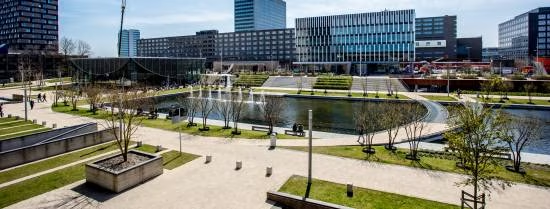EUR Advisory Committee Sensitive Collaborations (CGS) will study Erasmus University Rotterdam’s institutional ties with Israel and issue an opinion on it. Chairman Ruard Ganzevoort spoke to NRC about the working method, the dilemmas, and the central question the CGS will try to answer: “Where is the balance between academic freedom and social responsibility?”
Ruard Ganzevoort, rector of Erasmus University Rotterdam’s Institute for Social Studies, is chair of this committee. The CGS will work out the rules and then issue advice on each collaboration separately, first of all on the Israeli collaborations.
Ganzevoort has been working for some time on devising a basis for the ethical rules, in response to previous questions about our university’s collaborations, such as relationships with the fossil industry. An overview of EUR’s collaborations with Israeli universities was shared in early May with students and staff. This information was and is not intended to become public for security reasons.
Academic boycott is too brief
A process of first taking stock, thinking, discussing and only then deciding is seen by protesters as a delaying tactic. Ganzevoort explains that this is absolutely not the case: “I understand that there are people who say: you have to put an immediate stop to it. But from the responsibility you have as a board, that is too short. You also have to know the negative consequences of severing those ties. And you have to be consistent in your reasoning. Do we ask the same questions in collaborations with US universities, for example?”
The comparison with the outbreak of war in Ukraine is often made: back then, Dutch universities did immediately sever all ties with Russia. Ganzevoort points out that that was a different case, because the Dutch government had imposed sanctions against Russia at the time. There is currently no such thing in the situation in Israel and Gaza. Should a university engage in politics? “Universities are very cautious about that and so is the committee,” Ganzevoort argues.
Dilemmas
Ganzevoort mentions in NRC several dilemmas that the CGS are already running into. For example, there are both pros and cons on whether or not to stop student exchanges with Israeli universities or consortia that include institutions from many more countries than just the Netherlands and Israel. Or consider research on a rare disease together with an Israeli university that would be stopped: the question is how to weigh that up.
Not only the research itself, but also the institution is looked at by the CGS. Whether there is room for critical voices at such a university can be looked at – however, if there is none, that is not an unqualified reason to sever ties. “Because perhaps the cooperation with the Netherlands leads to the possibility of some internal criticism after all,” Ganzevoort says.
He stresses that these issues have high urgency, but it is hard to say how quickly decisions can be made. “I wish I could do this faster but I can’t. The committee will be installed this week and then we will start working as soon as possible.”
- More information
Read the full article in NRC (Dutch).
Keep an eye on the latest updates via our live blog.- Related content

